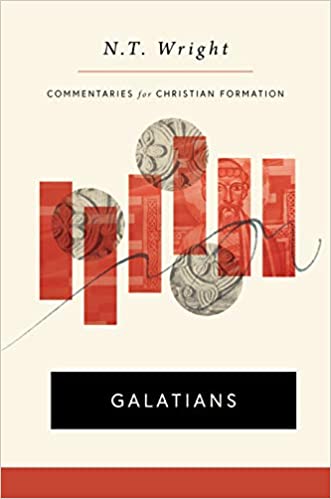Though Tom Wright has written many fine monographs, a good biography of Paul, a whole series of William Barclay like small commentaries for the laity, what he had not done thus far is write major stand alone commentaries on NT books (he did write a helpful mid-level Romans commentary for the New Interpreter’s Bible series in 2002). But now he has written a very fine, clearly written mid-level commentary on Galatians, and the only problem is we wish he had many more commentaries like this one from Tom. This one runs to some 440 pages, and shows good interaction with much recent discussion, particularly among English speaking academics, on this crucial letter. This has immediately become my favorite Galatians commentary written in the last 15 or so years. Hands down.
In the first place, Tom makes a, to my mind, very convincing case that Galatians is Paul’s earliest extant letter, and we should see it as written to churches in south Galatia and written before the famous Acts 15 council where it was agreed that Gentiles need not submit to circumcision (indeed I would say the decree is not about specific OT laws at all, but rather the more general need for gentiles to avoid the idolatry and immorality associated with pagan idol feasts in pagan temples, the very place you find the 4 items listed— ‘food offered to idols, things strangled, blood, and porneia’. The issue is one of avoiding pagan worship and fellowship meals in which the idol was present and participating in his or her temple. In other words, the issue is primarily spiritual pollution, venue, more than menu, and this is indeed how Paul interprets the decree in 1 Cor. 8-10 written not long after the Acts 15 council. But I digress.).
Perhaps it will be helpful at the outset to let Tom speak for himself in regard to what he sees as the social setting that prompted this letter. “In S Galatia the pressure on Jesus-believers who had now given up worshipping the gods, especially the Roman cults, was because they were in effect claiming the ‘Jewish exemption’ but without being physically Jewish — thus causing trouble in all directions. The rival teachers were then trying to ‘make a good showing in the flesh’ i.e. to get these anomalous folk circumcised, not as part of a ‘keeping the whole Torah’ programme but as part of a ‘keep up appearances before the pagans on the one hand and the Jerusalem folk on the other’. That’s the dynamic I’m following throughout the commentary.” (a comment he sent me in an email when I showed him the first draft of the review).
Having dealt with the Prolegomena in convincing fashion, Tom then works carefully through the whole book of Galatians offering helpful and insightful exegesis and implications seriatim. Among other things he rightly points out this letter is an appeal to unity, and an appeal for the Galatians to avoid getting themselves circumcised and thus having to keep the entire Mosaic covenant. Indeed, as Tom says, Paul believes that even a Jewish follower of Jesus like himself has died to the Mosaic law, and is not under its jurisdiction any more. He goes on to argue that the Mosaic covenant, a good thing, was for a limited time period— until the Messiah came to redeem those under the Law out from under the Law. One main goal of Galatians is for the largely Gentile audience to realize they are already part of Abraham’s family through Christ, the seed of Abraham. The new covenant is the fulfillment of the Abrahamic covenant and its promises of Abraham being a blessing to the Gentile nations, not just to Israel.
What Galatians is not about is the old Lutheran paradigm that Paul is setting up a faith alone vs. works or a law vs. grace antinomy in his discourse, as Tom makes very clear indeed. Equally clearly this letter is not about a Protestant critique of Catholicism! Yes, it is about justification by grace through faith, but in the context of Jew and Gentile united in Christ not later Reformation polemics. No, it’s not about avoiding salvation by works or dying and going to heaven. For Paul the afterlife focus is on the future resurrection and life in the new creation in the Kingdom here on earth, not in some disembodied state in heaven.
As Tom goes on to say, since the main focus of this letter is about creating one community of Christ, involving both Jews and Gentiles, and NOT doing it by requiring Gentiles to get circumcised and become Jews (which is what ‘Judaize’ means as Tom points out). But today this issue is moot in various respects. When’s the last time you heard a sermon about not getting circumcised? What this means is applying a letter like this for Christian formation today takes considerable discernment and care, and Tom does this with great skill. This is not a dead letter for today’s church, to the contrary if it is really embraced and applied, it involves applying some theological dynamite to the church’s current ethnic, racial, denominational etc. divisions.
I have to confess this is the first commentary I have actually read cover to cover, word for word, and enjoyed every bit of it, even in places where I demurred from Tom’s views (on which see the dialogue in numerous posts which follow this one). My view is that this commentary should be on the shelf of any serious student of Galatians, be they clergy or laity. You will not have to wrestle like Jacob to get a blessing out of this book. There are things worth learning and embracing throughout.













